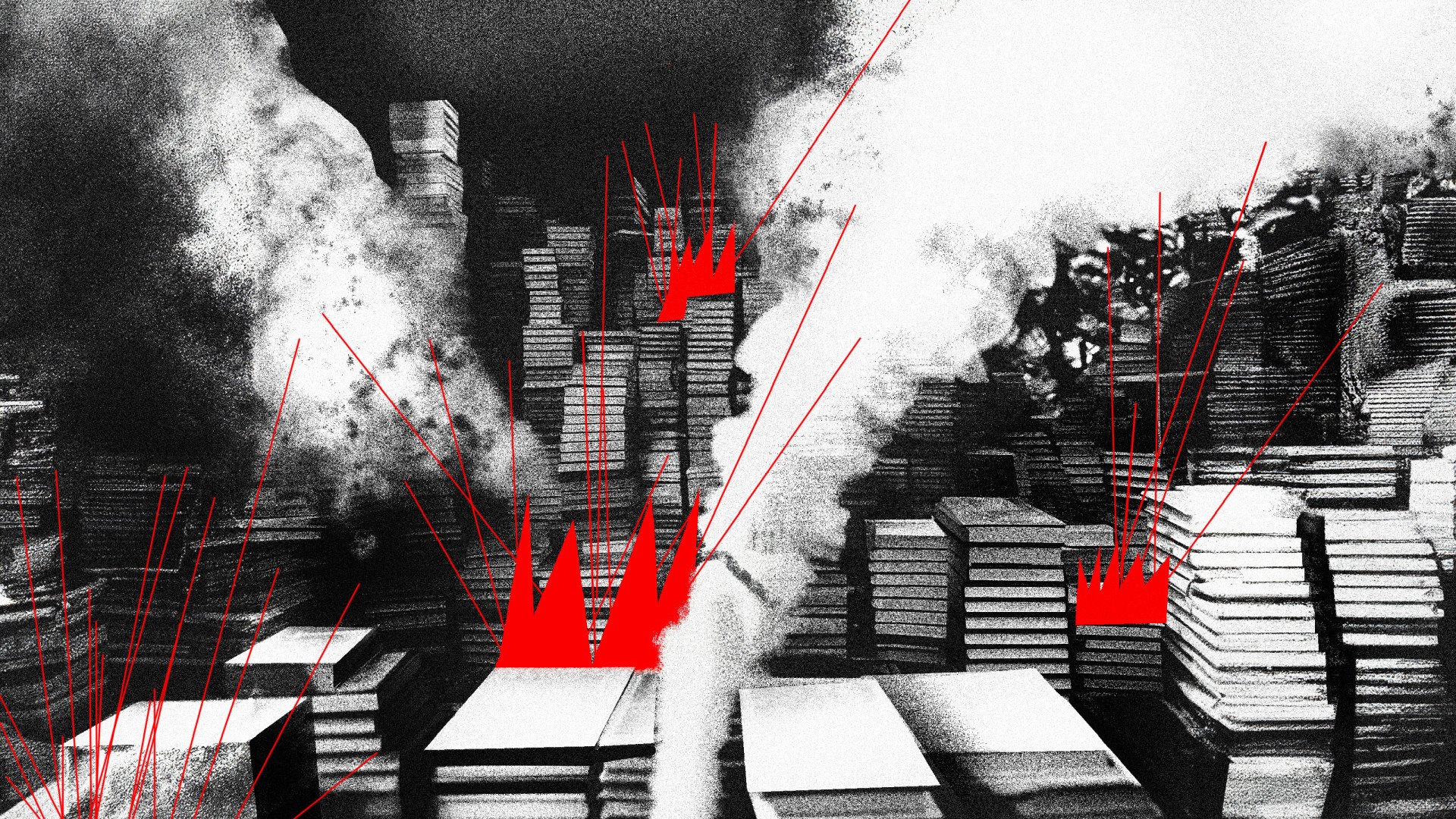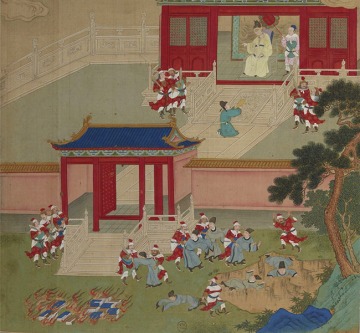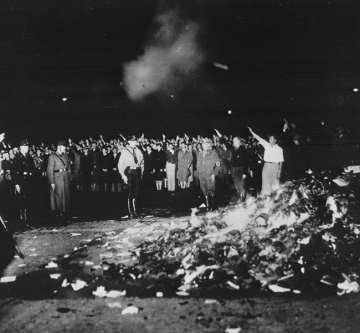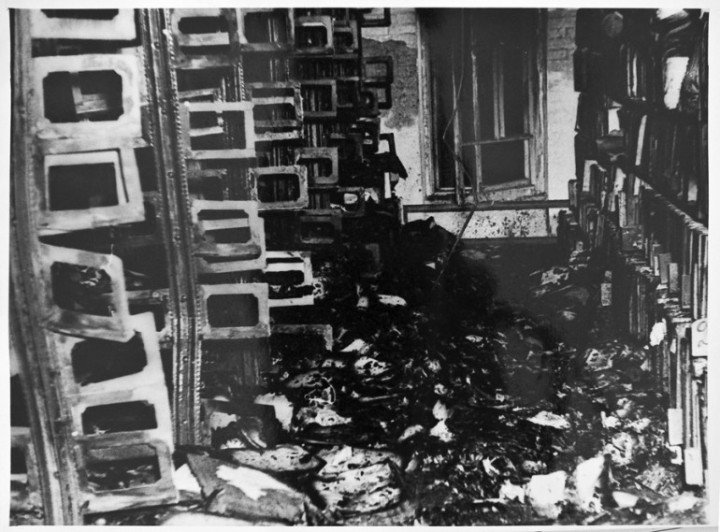- Category
- War in Ukraine
In the Aftermath of Russia's Attack on a Printing House in Kharkiv, Here's Their Logic Behind the Killing of Ukrainian Books

On May 23rd, Russia destroyed a Ukrainian book printing facility in Kharkiv with missiles—killing 7 people and injuring 20+ more. Images of Ukrainian books burning horrified many across the world. Although there is truly no target off limits for Russia, what is the logic behind an attack on a warehouse with Ukrainian books?
Over the past several months, Russia has been consistent in trying to eradicate Ukraine’s second-largest city—Kharkiv. On May 23rd, Russia launched yet another attack on the city, killing seven people and injuring 21.
Although Russia has proven time after time that there is truly no target off limits: residential buildings, universities, schools and kindergartens, maternity wards and hospitals, department stores and pharmacies, museums, playgrounds, and parks, the place and reasoning behind its attack on May the 23rd might seem confusing since Russia decided to target ‘Factor-Druk’—a book printing facility.
What is the logic behind this attack? There are no military targets in warehouses, no agglomeration of civilians upon whom you can inflict terror, why spend millions of dollars on an attack against books? While the rationale seems odd at first glance, we must not forget that the war against Ukraine extends far beyond geopolitical interests and that it is a deliberate colonial attempt to ‘cleanse’ the city and country of everything Ukrainian through the only means available to Russia—killing. The killing of books, which embody and transmit history, culture, language, as well as the people who create them.
Book burning as a political weapon
Book burning as a political weapon is not a new concept. It has been practiced through centuries: from the time of Chinese emperor Qin Shi Huang, who ordered the burning of texts and over 400 scholars who wrote them, to the burning of the library of Pantainos in Greece during the Heroulian invasion in 267 and the burning of Maya codices by Spanish colonizers in 1562, who saw the texts as ‘nothing but superstitions and lies of the devil’, to the more recent book burnings of 1933 in Nazi Germany, the destruction of Bosnia’s National and University Library in 1992, which destroyed over 2 million volumes or the destruction of libraries in Iraq by ISIS. This political weapon, however, has often been either a prelude or an addition to subsequent human tragedies. Just as this poignant quote illustrates:
Where they burn books, they will, in the end, burn human beings too.
Heinrich Heine
German poet and writer.


Cecilia Sjöholm, a professor at Södertörn University in Sweden, examines book burning through the lens of deliberate violence in her essay ‘Burning Books: Sovereignty and the Fire of Literature’. Sjöholm mentions that while the process of burning books might at first seem confusing, as it asserts so much violence against objects that are neither alive nor exerting any kind of power, there is logic behind the act. Russia is trying to destroy the Ukrainian language and ruin not so much present but future ways of life.
However, the act of destruction is not only about destruction itself, argues Rebecca Knuth, professor of Library and Information Science at the University of Hawaii, in her book ‘Burning Books and Leveling Libraries: Extremist Violence and Cultural Destruction,’ but a form of deliberate extremism, a way of establishing dominance and installing a new order, by a method that similarly sparks genocide and ethnocide. This desire is especially true for the colonizer, who, through the act of book burning, also attempts to destroy the fundamental component of what makes a book a book—language. The French linguist Louis-Jean Calvet agrees that linguicide, the death of a language, and colonization typically go hand in hand. In his book ‘Language Wars and Linguistic Politics’ he outlines two main steps of linguistic colonization: the first is the vertical step, which is a social spread of language that starts with those in power installing an idea of a ‘superior’ language and limiting access to certain privilege to those, who speak it and the second is the horizontal step, which relies on the language spreading together with the borders of an empire. Though Russia may be many things, it is not ignorant to the power of language.
We can see the manifestation of this through multiple examples of the past and recent present, as well as through Russian internal (for example, ordering the Republic of Tatarstan to switch to Cyrillic instead of the native Arabic and/or Latin script) and external (such as reinforcing the idea of a ‘superior’ Russian language compared to the ‘provincial’ Belarusian) linguistic colonization.
However, when it comes to Ukraine, Russia’s persistence is nothing but jaw-dropping. According to the National Historical Library of Ukraine, over the past 400 years, Russia has attempted to partially or fully ban the Ukrainian language over 130 times. For instance, in 1863 Imperial Russia issued the Valuev Circular, a decree forbidding the usage of Ukrainian in literature, mentioning that ‘no special Little Russian language (as in Ukrainian) ever existed, does not exist, and shall not exist’, sending its message loud and clear — no Ukraine ever existed, does not exist, and shall not exist.
Language, literature, and politics as a force of resistance
When combined, language, literature, and politics offer a powerful force of resistance to the oppressor, a force one cannot simply ignore. For instance, the Brotherhood of Saints Cyril and Methodius, a secret Ukrainian political organization operating in 1845-1847 that fought for Ukraine’s autonomy, consisted mostly of writers. Ukraine’s celebrated poet Taras Shevchenko was amongst its members. It was promptly and forcefully torn down by the imperial regime for “promoting harmful nationalistic ideas.” While the fall of the Russian Empire in 1917 offered the abolition of imperial censorship and with it hope for better times ahead, the appointment of Soviet Premier and General Joseph Stalin made it evident that Russia had no intention of allowing Ukrainian to bloom, let alone allow it to be used as a weapon of political protest. According to Ukrainian writer and journalist Oleksa Musiienko, more than 240 poets, writers, and other intellectuals, known in Ukraine as the ‘Executed Renaissance’ were killed during this cultural purge. The vicious irony which seems to transcend through time, is that most of those who were killed were arrested in Kharkiv—the capital and cultural center of the Ukrainian Soviet Republic until 1934.
As it happens, Russia did not stop there. After Stalin’s death, Ukrainian authors of the 60s, known as ‘Sixtiers’, ‘Shistdesiatnyky’ or ‘Zadushene Vidrodzhennia’ (in English Strangled Renaissance’) were persecuted, arrested, and killed for protesting against the regime through literature and art, however, this time Russia did not stop on people—in 1964 the National Public Library of the Academy of Science in Kyiv, now known as the Vernadsky National Library, was set ablaze by a member of the KGB, Russia’s Committee for State Security.

Although Ukraine’s proclamation of independence in 1991 finally offered the opportunity for Ukrainian literature to flourish in a way it previously was not allowed to, Russia continued to exert its colonial power through constant political and cultural interference. Ultimately, Russia’s actions were not enough to convince Ukrainians that the prospect of colonization was better than the alternative offered by Europe—freedom and democracy.
It is, therefore, not surprising that when Russia started its war against Ukraine in 2014 and then proceeded to launch its full-scale invasion in 2022, Ukrainian book destruction followed.
Ukrainians are reading more than ever
However, despite Russia’s persistent efforts to alter Ukraine’s connection to literature and by proxy to her culture, Ukrainians are reading more than ever. In September-October 2023, the NGO "Publishers Forum" conducted a survey to research how reading has become a social-cultural practice for Ukrainians. These were among the results:
17% of Ukrainians have incorporated reading into their daily routine, a result that more than doubled as compared to data from 2020;
What nearly doubled was the amount of Ukrainians, who started reading books in Ukrainian—54% in 2023 compared to 32% in 2020.
Dr. Joi Barrios-Leblanc, a professor of literature at UC Berkeley mentions that language is the doorway to understanding culture and heritage and that history is often hidden in the colonial narratives written in the language of the oppressor. Therefore, by choosing to speak and read in their native tongue, Ukrainians are not only making the conscious decision to embrace their culture outside of Russian colonial and imperial taint but also to factually demonstrate how a language can be a country’s sword and shield.
Similarly, since the beginning of Russia’s full scale invasion in 2022, the percentage of people using Ukrainian in their day-to-day communication has been increasing (65% in December 2023 as compared to 53% in April 2022). If this trend continues, the next generation of Ukrainians might become the first to free themselves from Russia’s attempts at linguistic, and by proxy cultural, colonialism—a terrifying prospect for a state that has set its course on following Aleksander Dugin’s ‘Eurasian project’ and relying on expansion for survival, as Jane Burbank and Frederick Cooper, authors of ‘Post-Imperial Possibilities: Eurasia, Eurafria, Afroasia’ argue.
Russia’s attack on ‘Factor-Druk’ was not a coincidence, nor was this a misfire—writes Ukrainian journalist Khrystyna Kotsira, who shared her thoughts on Facebook:
“Writer Volodymyr Vakulenko hid his manuscripts describing Russian occupation under a cherry tree in his home. Russians killed him. Writer Victoria Amelina found those manuscripts. Russians killed her, too. The publishing house ‘Vivat’ produced Vakulenko’s manuscripts. Russians attacked their printing house. They killed their workers. They destroyed thousands of books. This is the ‘Executed Renaissance’ of the 21st century. The killers are the same.”
In fact, according to Serhiy Polituchy, the founder and president of group companies ‘Factor’ among which is ‘Factor-Druk,’ the printing facility printed a third of the total number of books in Ukraine, with approximately 40 percent being school textbooks. Additionally, just prior to Russia’s full-scale invasion of 2022, Kharkiv hosted over 150 polishing houses, and the city was responsible for producing over 80% of Ukrainian books. So circling back to the question posed at the beginning of the article, specifically why spend millions of dollars attacking books? The answer seems to be such—Ukrainian books are dangerous for Russia’s colonial project. They are dangerous because they cannot be rendered, censored, or controlled. The existence of the Ukrainian book is a threat to Russia because it embodies the one thing Russia refuses to accept—the existence of a free Ukraine. A Ukraine with her culture and language, a Ukraine with her own past, present, and future.
-38556bf61e11af04a17331caebf42b61.jpeg)

-554f0711f15a880af68b2550a739eee4.jpg)



-206008aed5f329e86c52788e3e423f23.jpg)
-1afe8933c743567b9dae4cc5225a73cb.png)
-46f6afa2f66d31ff3df8ea1a8f5524ec.jpg)